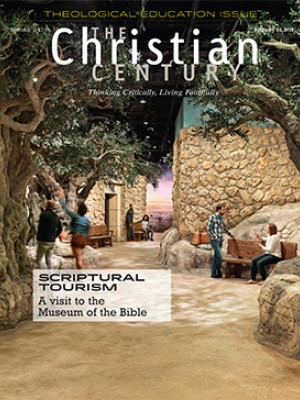George Lindbeck, a founder of postliberal theology, dies at age 94
He is best known for his 1984 book The Nature of Doctrine and his engagement in the ecumenical movement.

George Lindbeck, one of the most influential Protestant theologians of recent decades, died on January 8 at age 94 in Florida.
Kristen Lindbeck, his daughter, wrote on social media that he died “slipping so quietly from sleep to death that I . . . did not realize it, and the hospice nurse needed to check with her stethoscope. As good as death can be.”
He grew up in China, where his parents were missionaries. He said in a 2006 Christian Century interview that knowing people who were formed by both Christianity and Confucianism gave him the convictions “that the communal shapes us more than we shape ourselves” and that “human basics are everywhere and always pretty much the same.”
Lindbeck taught at Yale from 1951 until his retirement in 1993. A Lutheran, he served as a delegated observer at the Second Vatican Council (1962–1965). Since that time his work has been a part of ecumenical discussions, especially those between Lutherans and Roman Catholics.
Read our latest issue or browse back issues.
“He was able to cross what were for some scholars (and Christian believers) too high barriers in thought and action,” wrote Margaret Farley, a Catholic colleague at Yale, in a statement. “A very gentle person, and a searcher of truth, he respected and even reverenced the faith and hope in all of the major Christian traditions.”
His 1984 book The Nature of Doctrine: Religion and Theology in a Postliberal Age helped launch the postliberal movement in theology.
“Lindbeck contended that religious traditions are historically shaped and culturally encoded,” wrote Gary Dorrien in a 2001 Century article about postliberalism. “Christian doctrines should not be understood as universalistic propositions or as interpretations of a universal religious experience. Doctrines are more like the rules of grammar that govern the way we use language to describe the world.”
In 1990 Lindbeck contributed to the Century series How My Mind Has Changed, describing how his own thinking on ecumenism had shifted.
Christians should reconceive ecumenical work as that of reconstituting Christian community at the grass roots rather than reconciling communions from the top down, Lindbeck wrote. “This focus on building Christian community will seem outrageous to some in view of the world’s needs, but it is a strength for those who see the weakening of communal commitments and loyalties as modernity’s fundamental disease. Perhaps no greater contribution to peace, justice, and the environment is possible than that provided by the existence of intercontinental and interconfessional communal networks such as the churches already are to some extent, and can become more fully, if God wills.”
To make that possible, Lindbeck advocated revisiting the biblical story of Israel.
“Christians can now apply Israel's story to themselves without supersessionism or triumphalism” by not repeating errors in the early church that “resulted from self-serving gentile Christian misappropriations of intra-Jewish polemics over Jesus' messiahship.” Calling for an “Israel-like view of the church,” he wrote, “All Christians, whether Catholics, Protestants and Orthodox or African, American and Chinese, belong to a single community of morally imperative responsibility for one another like the members of the early church or contemporary Jews.”
A version of this article, which was edited on January 29, appears in the February 14 print edition under the title “People: George Lindbeck.”






